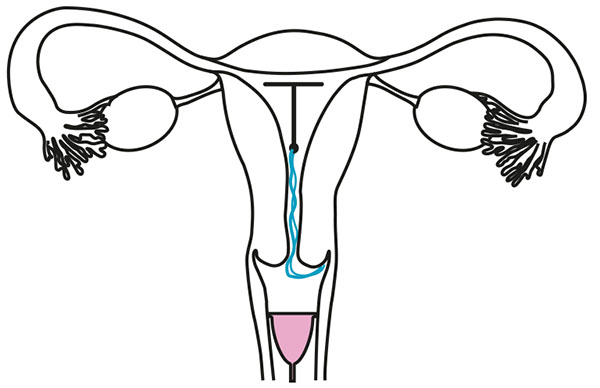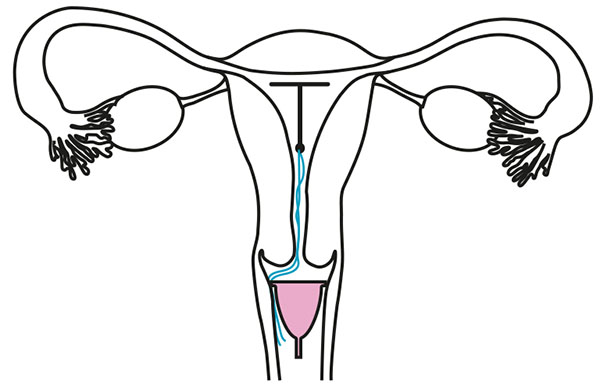A coil is a small, flexible T shaped device that is fitted into the uterus (womb). It is a very effective way of preventing pregnancy.
There are two main types:
- Hormonal coil: IUS
- Most types work for 5 years or more. Visit the Contraception Choices website: IUS for more information.
- As well as providing contraception, an IUS is good if you have heavy or painful periods as it usually lightens or stops your period.
- If you want a coil to control your periods or for HRT but do not need contraception, please see your GP as they need to refer you by letter to the right service.
- Copper coil: IUD
- This coil can be used for emergency contraception as well as ongoing contraception.
- Most types work for 5 years or more.
- There are absolutely no hormones, so your periods will continue (they may become longer, a little more heavy and painful).
- Visit the Contraception Choices website: copper coil for more information.
Information alert: Smear tests
We do not offer smear tests. You may receive a letter from Public Health England saying that you can book an appointment for a smear test at your local sexual health clinic but this information applies to sexual health clinics in other parts of the country, not Oxfordshire. Please go to your GP Practice instead.The emergency coil
Go to emergency contraception
Coil fitting
How do I get a coil fitted?
Please book a telephone appointment; you will then be given a clinic appointment if appropriate.
If you have experienced difficulty with a previous fit or been told that a fit may be difficult, let us know during your telephone appointment. We can make sure we book you into the most appropriate clinic for the fitting procedure. You could also go to your GP and ask them to refer you by letter if you prefer.
How should I prepare for my coil fit appointment?
- You may want to bring a friend, relative or partner with you. Sometimes people feel a bit shaky after the procedure and it can be helpful to have support and somebody to take you home.
- Ensure you have read the appropriate leaflet:
- Make sure you have had something to eat.
- Take some painkillers 30 minutes before your appointment (for example, paracetamol or ibuprofen).
- We may not be able to fit the coil if there is any risk of pregnancy, so:
- Use your current contraception reliably until your appointment (condoms alone are not adequate) OR do not have any sex at all (even with a condom) for 3 weeks prior to your appointment.
- Do not have sex for 7 days prior to your fit if you are having a coil exchange (with an in date device).
Can I get a hormone coil if it isn’t for contraception?
The hormone coil may be used for non-contraceptive purposes such as HRT or control of heavy periods. We recommend that you visit your GP who may be able to do this for you.
If not, your GP can refer you by letter to the correct service.
Changing your coil
My current coil needs changing
There is very good evidence that coils last longer than we used to think. National guidelines support the use of some coils for longer than the period they are licensed for (this is known as “off-label” use).
See the table below to understand how long you can continue to use your coil for contraception. For more information on what “off-label” means, see the leaflet Unlicensed and “off-label” medicines (pdf).
| Type of contraception | Licensed for | Can it be used as contraception for longer than the licensed time? |
|---|---|---|
| Jaydess | 3 years | No |
| Kyleena | 5 years | No |
| Mirena | 5 years | Yes. If using Mirena for HRT, it should be replaced at 5 years as usual. Otherwise:
|
| Levosert | 6 years | Sometimes:
|
| 5 year copper IUD For example, Mini TT380, Nova T380, Neo Safe 380 (Mini), Multi-load, Gynefix |
5 years | Sometimes:
|
| 10 year copper IUD For example, TSafe 380, Paragard |
10 years | Sometimes:
|
Please book a telephone appointment if you need a replacement coil or if you have changes in your bleeding pattern, abnormal discharge or lower abdominal pain. You will then be given a clinic appointment if appropriate.
Coil removal
I want to have my coil removed
Please book a telephone appointment; you will then be given a clinic appointment if appropriate.
If you do NOT wish to be at risk of pregnancy, use condoms or don’t have sex for seven days before your coil removal appointment.
If you are having your coil removed because you want to get pregnant, the pregnancy page has information on planning a pregnancy.
Unable to feel your threads?
If you can’t feel the threads of your coil, please book a telephone appointment; you will then be given a clinic appointment if appropriate.
Do not rely on your coil for contraception until we have checked that it is still in the correct place – use condoms or don’t have sex. If you think your coil has fallen out, and you have had sex and may need emergency contraception, then please contact us as soon as possible for a telephone appointment.
Using a menstrual cup if you have a coil fitted
You can use a menstrual cup if you have a coil fitted, but it is important to make sure you position and release the cup correctly:
Correct

- Tuck the coil threads up in the top of the vagina.
- Fit the menstrual cup in the mid to lower vagina below the threads.
- Always release the cup suction before removal.
Incorrect

DO NOT fit the menstrual cup high in the vagina – you could trap the threads against the vaginal wall and tug on them when removing the cup.
For more information, see INTIMA – using a menstrual cup and IUD together – what you need to know.
Pregnancy
There is still a very small chance of becoming pregnant if you have a coil fitted.
If you are pregnant, your coil should be removed as soon as possible. Contact your local Early Pregnancy Assessment Unit for a scan, assessment and coil removal.
Early Pregnancy Assessment Unit (EPAU) – Oxford University Hospitals Website
If you need advice about future contraception, we can help. Please book a telephone appointment; you will then be given a clinic appointment if appropriate.


